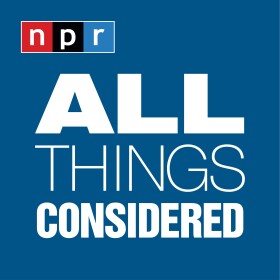
All Things Considered
Weekdays 4 - 6:30 p.m., Weekends 5 - 6 p.m. on 88.5 NEPM
Every weekday, join NPR’s Ari Shapiro, Mary Louise Kelly, Alisa Chang, Juana Summers and New England Public Media's Kari Njiiri and Adam Frenier for breaking news mixed with compelling analysis, insightful commentaries, interviews, and special — sometimes quirky — features.
-
Some U.S. Olympians at the Winter Games spend most of their lives overseas, training and putting down roots in the countries they compete against.
-
Tariffs, DHS funding and international tensions are expected to be at the heart of the president's State of the Union speech to Congress this week.
-
NPR's Emily Kwong speaks with Sadeqa Johnson about her new novel THE KEEPER OF LOST CHILDREN and discovering the story of mixed-race children who were left in German orphanages following World War II.
-
Father Andriy Zelinskyy, a chaplain in wartime Ukraine, talks about what he sees in the trenches and what he's learned about the fragility of humanity, years into the war with Russia.
-
In Milan, the site of the Winter Olympic Games, the mayor is taking steps to help migrants while the national governments seeks to discourage immigration.
-
An inmate who was imprisoned for 21 years in Syria's notorious Sadnaya prison shows NPR's Jane Arraf the concrete cells where he was held.
-
An Academy Award in Best Casting will be the newest prize at the Oscars in March. An NPR panel examines what an achievement in casting might mean.
-
Salsa legend, Willie Colon, has died at age 75. Colon was a key part of salsa's development in the 1970's as an instrumentalist, songwriter and producer.
-
President Trump announced a 15% increase on tariffs across the board. Europeans have been celebrating yesterday's SCOTUS decision, but have been doing so quietly.
-
Last year, the video game industry generated around $190 BILLION in revenue. More than the music and film industry combined. How did this medium go from the arcade into a global juggernaut? That's the subject of a new podcast series called Hidden Levels.




















